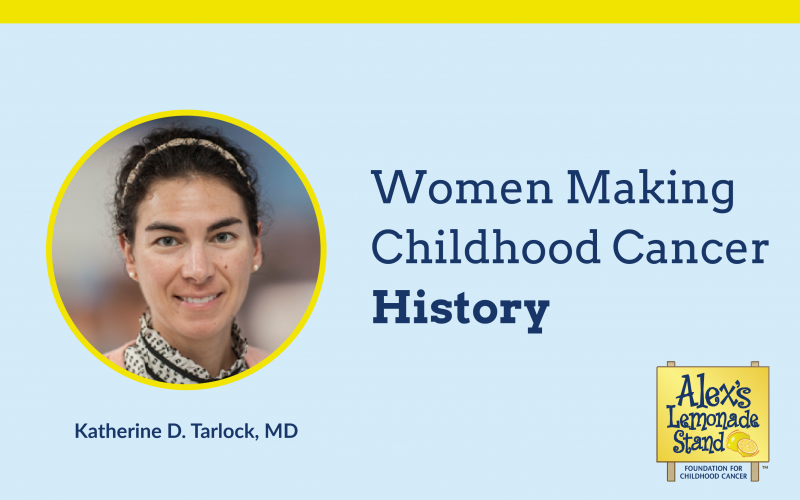
By: Anna C. Greene, PhD
For Katherine G. Tarlock, MD, Assistant Professor of Pediatrics at the University of Washington and Seattle Children’s Hospital, becoming a physician scientist focused on pediatric leukemia was a perfect blend of helping children and their families, allowing the formation of deep relationships with them, alongside her love of research. For her, research is so intertwined with clinical practice; they complement and reinforce one another, allowing her to provide the best possible care for children with cancer.
During Dr. Tarlock’s pediatric oncology fellowship, she realized that she would need funding to be able to continue to do research in addition to clinical care. She applied for and received an Alex’s Lemonade Stand Foundation (ALSF) Young Investigator (YI) grant designed to support early career researchers and to provide funding to conduct their research alongside their clinical practice.
For Dr. Tarlock, the grant from ALSF was transformative—allowing her to continue her research, build her expertise in acute myeloid leukemia (AML) and now, lead critical clinical trials for children with AML.
AML, which is a cancer of the blood and bone marrow, has just a 67-percent five-year survival rate.
Dr. Tarlock’s YI project focused on mutations in the FLT3 gene, a common mutation in AML. She discovered that there is a range of FLT3 mutations which affect AML and that children with an activating FLT3 mutation may be able to be treated with a FLT3 inhibitor. Her research has led to an ongoing clinical trial to study the effect of adding a FLT3 inhibitor, Gilteritinib, to standard chemotherapy for children newly diagnosed with AML with activating FLT3 mutations.
AML is a biologically heterogeneous disease, meaning that the same disease can be caused by different underlying genetic drivers, yet many patients receive the same treatment. To improve survival and lessen harsh treatment effects, a greater emphasis on targeted treatments for specific subgroups is needed.
Dr. Tarlock is also currently working to identify new targets for immunotherapy, a type of treatment that harnesses the immune system to kill cancer cells. For immunotherapies such as Chimeric Antigen Receptor (CAR) T cell immunotherapy, there needs to be a molecule (a target) attached to the surface of the cancer cells specific to them so that they can be found and destroyed by the immune system. To avoid toxicity, the target needs to be unique to the cancer cells and not also found on the surface of normal cells.
CAR T cell therapy has been successful in acute lymphoblastic leukemia (ALL) but has not seen the same level of success in AML. Unlike ALL, target identification for AML is more challenging because many of the targets found on the cancer cells are also found on normal blood cells which can lead to toxicity.
Recently, she has identified a unique target, mesothelin, that is found on AML cells in approximately one-third of AML cases and not on normal blood cells, which is ideal for immunotherapy applications. She’s currently developing a clinical trial to target this protein, bringing more hope to children with AML.
“The ALSF YI grant was essential in progressing my research in the biology of AML and my development as a cancer researcher. The YI grant was my first grant following fellowship, and my project confirmed my passion to make research a part of my career with a focus on identifying potential targets and developing clinical trials that test new therapies for these targets in children with AML,” said Dr. Tarlock.

